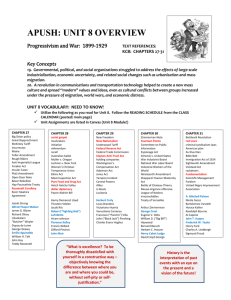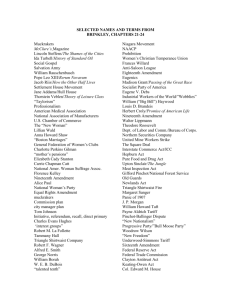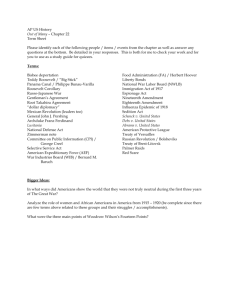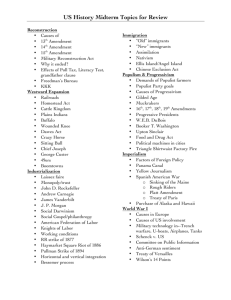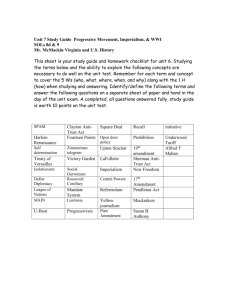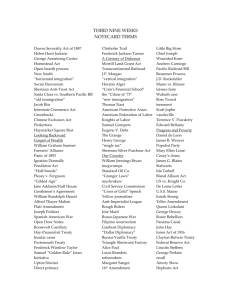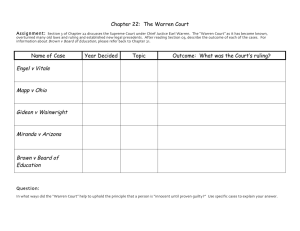APUSH Exam Review
advertisement
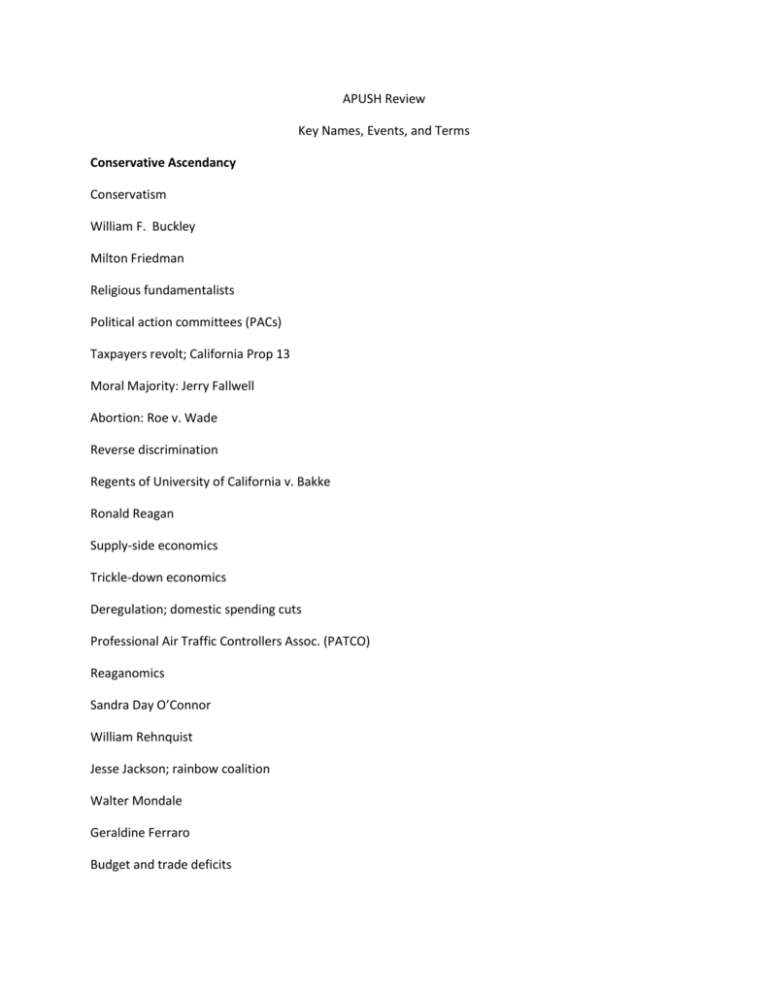
APUSH Review Key Names, Events, and Terms Conservative Ascendancy Conservatism William F. Buckley Milton Friedman Religious fundamentalists Political action committees (PACs) Taxpayers revolt; California Prop 13 Moral Majority: Jerry Fallwell Abortion: Roe v. Wade Reverse discrimination Regents of University of California v. Bakke Ronald Reagan Supply-side economics Trickle-down economics Deregulation; domestic spending cuts Professional Air Traffic Controllers Assoc. (PATCO) Reaganomics Sandra Day O’Connor William Rehnquist Jesse Jackson; rainbow coalition Walter Mondale Geraldine Ferraro Budget and trade deficits Military buildup Nicaragua; Sandinistas; Iran-Contra Affair Middle East; Palestine Liberation Organization Mikhail Gorbachev; glasnost, perestroika George Bush (41); Dan Quayle Tiananmen Square, Beijing Soviet Union breakup, end of Cold War Boris Yeltsin Panama Invasion Persian Gulf War 1991 Saddam Hussein Americans with Disabilities Act 1990 27th Amendment William Jefferson Clinton Albert Gore Ross Perot Carol Moseley-Brown NAFTA Newt Gingrich Contract with America New world order Yugoslavia, civil war; Bosnia Limits of a Superpower Richard Nixon Henry Kissinger Vietnamization Nixon Doctrine Kent State My Lai Pentagon Papers Paris Accords of 1973 Détente China visit Soviet Union; SALT New Federalism Stagflation Southern strategy Warren Burger George McGovern Watergate; articles of impeachment United States v. Nixon War Powers Act (1973) Middle East War (1973) OPEC; oil embargo Gerald Ford Cambodia; Khmer Rouge Bicentennial James Earl (Jimmy) Carter Human rights Panama Canal treaty (1978) Camp David Accords (1978) Anwar Sadat; Menachem Begin Iran; hostage crisis Afghanistan invasion - soviet Cultural pluralism Immigration Act 1965 Immigration Reform and Control Act 1986 Mexican Americans Cezar Chavez American Indian Movement Indian Self-Determination Act 1975 Asian Americans Gay liberation movement Environmental movement Nuclear accidents; Three Mile Island, Chernobyl Clean Air Act 1970 Environmental Protection Agency Clean Water Act 1972 Environmental Superfund AIDS 1960s John F. Kennedy Jaqueline Kennedy New Frontier Peace Corps Alliance for Progress Trade Expansion Act 1962 Bay of Pigs Berlin Wall Cuban Missile Crisis 1962 Nuclear Test Ban Treaty Warren Commission Lyndon Johnson Great Society War on Poverty Michael Harrington, The Other America Barry Goldwater Medicare; Medicaid Elementary & Secondary Education Act 1965 Ralph Nader, Unsafe at any Speed Rachel Carson, Silent Spring Lady Bird Johnson Civil Rights Act 1964 Equal Employment Opportunity Commission 24th Amendment Voting Rights Act of 1965 James Meredith Martin Luther King, Jr. March on Washington; “I Have a Dream Speech” Black Muslims Malcolm X Student Nonviolent Coordinating Committee Congress of Racial Equality Stokely Carmichael Black Panthers Watts riots Warren Court Brown v. Board of Ed. Of Topeka Gideon v. Wainwright Miranda v. Arizona Baker v. Carr “one man, one vote” Yates v. United States Separation of church and state Engel v. Vitale Students for a Democratic Society New Left Counterculture Sexual revolution Women’s movement Betty Friedan, The Feminist Mystique National Organization for Women Equal Pay Act 1963 Equal rights Amendment Vietnam War Tonkin Gulf Resolution Tet offensive Hawks and doves Eugene McCarthy Robert Kennedy George Wallace Hubert Humphrey Eisenhower Years 1952 – 1960 Dwight Eisenhower Richard Nixon Modern Republicanism Highway Act 1956; interstate highway system John Foster Dulles; “brinksmanship” Massive retaliation Third World Iran Covert action Indochina Geneva Conference Ho Chi Minh Vietnam Domino theory Southeast Asia Treaty Organization 1954 Suez Canal crisis 1956 Eisenhower Doctrine Organization of Petroleum Exporting Countries (OPEC) “spirit of Geneva” Open-skies crisis Nikita Khruschev Peaceful coexistence Hungarian revolt Warsaw Pact Sputnik National Aeronautics and Space Administration U-2 incident Fidel Castro Cuba Military-industrial complex Civil rights Jackie Robinson NAACP Desegregation Earl Warren Little Rock crisis Rosa Parks Montgomery bus boycott Civil rights acts 1957, 1960 Civil Rights Commission Southern Christian Leadership Conference Nonviolent protest Sit-in movment Consumer culture John Kenneth Galbraith, The Affluent Society Beatniks Truman and the Cold War 1945-1952 GI Bill 1944 Baby boom Suburban growth Sunbelt Harry Truman Employment Act of 1946 Council of Economic Advisers Inflation;strikes Committee on Civil Rights 22nd Amendment Taft-Hartley Act (1947) Progressive party Henry Wallace States-Rights (Dixicrats) Party Strom Thurmond Thomas Dewey Fair Deal Cold War Soviet Union United Nations World Bank Communist satellites Iron Curtain Winston Churchill George kennan Dean Acheson Containment policy Truman Doctrine Marshall Plan Berlin Airlift East Germany; West Germany North Atlantic Treaty Organization National Security Act 1947 Arms race U.S.-Japanese Security Treaty Douglas MacArthur Chinese Civil War Chiang Kai-shek Taiwan Mao Zedong People’s Republic of China Joseph Stalin Kim Il Sung Syngman Rhee Korean War; UN police action 38th parallel Smith Act 1940 McCarran Internal Security Act 1950 House Un-American Activities Committee Alger Hiss Whittaker Chambers Rosenberg case Joseph McCarthy Diplomacy and WWII, 1929 – 1945 Manchuria Stimson Doctrine Good-neighbor policy Pan-American conferences 1933, 1936 London Economic Conference 1933 Soviet Union, recognized Tydings-McDuffie Act Cordell Hull Fascism Italian Fascist party; Benito Mussolini German Nazi party; Adolf Hitler Axis Powers Isolationism Nye Committee Neutrality acts Spanish Civil War 1936-1939 Francisco Franco America First Committee Appeasement Ethiopia Rhineland Czechoslovakia Sudetenland Munich Quarantine speech Poland; blitzkrieg Cash and carry Selective Training and Service Act 1940 Destroyers-for-bases deal Wendell Willkie Four freedoms speech Lend-lease Act 1941 Atlantic Charter Pearl Harbor Office of Price Administration Smith v. Allwright Korematsu v. U.s. Harry S. Truman Battle of the Atlantic Dwight Eisenhower D Day Battle of the Bulge Holocaust Battle of Midway Chester Nimitz Douglas MacArthur Manhattan Project J. Robert Oppenheimer Atomic bomb Hiroshima; Nagasaki Big Three Yalta United Nations The Great Depression and the New Deal, 1929-1939 Great Depression Stock market; Wall Street Black Tuesday 10/29/1929 Dow Jones Index Income distribution Buying on margin Gross National product Herbert Hoover Hawley-Smoot Tariff 1930 Debt moratorium Farm Board Reconstruction Finance Corporation Bonus march 1932 Franklin D. Roosevelt Eleanor Roosevelt Twentieth amendment “lame duck” First New Deal Relief, recovery, reform Brain Trust Frances perkins Hundred Days Bank holiday Repeal of Prohibition Fireside chats Federal Deposit Insurance Corporation Public Works Adminstration Harold Ickes Civilian Conservation Corps Tennessee Valley Authority National Recovery Administration Schechter v. U.S. Securities and exchange Commission Federal Housing Administration Second New Deal Works Progress Administration Harry Hopkins National Labor Relations (Wagner) Act 1935 Social Security Act 1935 Father Charles Coughlin Francis Townsend Huey Long Supreme Court reorganization plan Congress of Industrial organizations John L. Lewis Sit-down strike Fair Labor Standards Act 1938 New Democratic coalition John Maynard Keynes Depression mentality Drought; dustbowl; Okies John Steinbeck, The Grapes of Wrath Marian Anderson Mary McLeod Bethune Fair Employment Practices Committee Philip Randolph Indian Reorganization (Wheeler-Howard) Act 1934 The 1920s Warren Harding Bureau of the Budget Teapot Dome Scandal Calvin Coolidge Herbert Hoover Alfred E. Smith Business prosperity Henry Ford Assembly line Open shop Welfare capitalism Jazz age Consumerism: autos, radio, movies Charles Lindberg Sigmund Freud Margaret Sanger Modernism Fundamentalism Revivalists: Billy Sunday; Aimee Semple McPherson Gertrude Stein Lost Generation F. Scott Fitzgerald Ernest Hemingway Sinclair Lewis Ezra Pound T.S. Eliot Frank Lloyd Wright Functionalism Edward Hopper Georgia O’Keeffe Harlem Renaissance Countee Cullen Langston Hughes James Weldon Johnson Claude McKay Duke Ellington Louis Armstrong Bessie Smith Paul Robeson Marcus Garvey Scopes trial Clarence Darrow Prohibition; Volstead Act 1919 Organized crime Immigration quota laws 1921, 1924 Sacco and Vanzetti Ku Klux Klan Disarmament Washington Conference 1921 Kellogg-Briand Treaty 1928 War debts Reparations Dawes Plan 1924 Zora Neale Hurston World War I Neutrality Submarine warfare Lusitania Sussex Pledge Allied powers Central powers Propaganda Preparedness Jeannette Rankin Edward House Zimmermann telegram Russian Revolution Mobilization George Creel War agencies Espionage Act 1917 Sedition Act 1918 Schenck v. United States Selective Service Act Bolsheviks American Expeditionary Force Fourteen Points Treaty of Versailles Big Four David Lloyd George Georges Clemenceau Vittorio Orlando League of Nations Henry Cabot Lodge Reservationists Irreconcilables Red Scare Palmer raids Emma Goldman Strikes; race riots The Progressive Era 1901-1918 Progressive movement Pragmatism William James John Dewey Frederick W. Taylor Scientific management Muckrakers Henry Demarest Lloyd Standard Oil Company Lincoln Steffans Ida Tarbell Jacob Riis Theodore Dreiser Australian ballot Direct primary Robert La Folette Direct election of senators; Seventeenth Amendment Initiative; referendum; recall Social welfare Municipal reform Samuel M. Jones Tom L. Johnson Charles Evans Hughes Hiran Johnson Theodore Roosevelt; Square Deal Anthracite coal miners’ strike 1902 Trust-busting Elkins Act 1903 Hepburn Act 1906 Upton Sinclair, The Jungle Pure Food and Drug Act 1906 Meat Inspection Act 1906 Conservation Newlands Reclamation Act 1902 Gifford Pinchot William Howard Taft Mann-elkins Act 1910 Federal income tax; sixteenth amendment Payne-aldrich Tariff 1909 Joseph Cannon Socialist Party of America Eugene V. Debs Bull Moose Party New Nationalism New Freedom Underwood Tariff 1913 Federal Reserve Act Federal Reserve Board Clayton Antitrust Act 1914 Federal Trade Commission Federal Farm Loan Act 1916 Urban migration Niagara Movement Booker T. Washington W.E.B. DuBois National Association for the Advancement of Colored People National Urban League Carrie Chapman Catt National American Woman Suffrage association Alice Paul National Woman’s Party Nineteenth Amendment League of Women Voters Foreign Policy 1865-1914 William Seward Napoleon III Mexico Alaska purchase 1867 “new imperialism” International Darwinism Josiah Strong, Our Country: Its Possible Future and Current Crisis Alfred Thayer Mahan, The Influence of Sea Power Upon History Pan-American Conference 1889 James Blaine Richard Olney Venezuela boundary dispute Cuba Jingoism Valeriano Weyler Yellow journalism Spanish-American war De Lome letter Maine Teller amendment Philippines George Dewey Theodore Roosevelt Rough Riders Hawaii; Liliuokalani Puerto Rico; Guam Philippine annexation Emilio Aguinaldo Anti-Imperialist League Insular cases Platt Amendment 1901 John Hay Spheres of influence Open Door policy Xenophobia Boxer Rebellion Big-stick policy Hay-Pauncefote Treaty 1901 Panama Canal George Goethals William Gorgas Roosevelt Corollary Santo Domingo Russo-Japanese War Treaty of Portsmouth 1905 Gentlemen’s agreement Great white fleet Root-Takahira Agreement 1908 Algeciras Conference 1906 William Howard Taft Dollar diplomacy Nicaragua Henry Cabot Lodge Lodge Corollary Woodrow Wilson New Freedom Moral diplomacy Jones Act 1916 Mexican civil war Victoriano Huerta Tampico incident ABC (Argentina, Brazil, Chile) Powers Pancho Villa Venustiano Carranza Expeditionary force John J. Pershing
